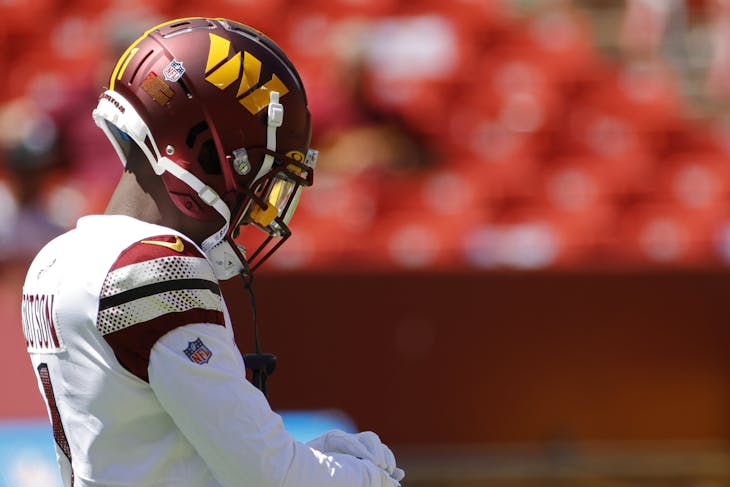
If you consume much fantasy content, you've doubtless stumbled across dozens of different strategies and "master plans" and "secrets to dominating your draft". Many of these strategies are mutually exclusive— some analysts will tell you to draft "Robust RB" (lots of running backs early), others will recommend "Hero RB" (one running back early and the rest late), and still others will swear by "Zero RB" (no running backs early).
Proponents of all three might claim they're the "best" approach, but we know in advance that, at a minimum, two of them are wrong. (Possibly, all three are.) The hardest part as a consumer of fantasy football content is figuring out which of those three (if any) is right.
That's why I'm going to do something different: when I say my draft strategy is the best, I'm going to explain exactly what advantages it provides... and then I'm going to prove that it provides those advantages.
But first, I want to get one thing out of the way. When I say "the best strategy", I mean "the best strategy in expectation". In 2021, the best strategy, with the benefit of hindsight, was probably something like "draft Cooper Kupp at all costs". But "draft Cooper Kupp at all costs" has likely been a losing strategy in every year but one.
With the full benefit of hindsight, the "dominant strategy" of 2023 (the strategy that results in the best win rate for its adherents) will probably be something unexpected, like "stack Raiders" or "draft Brandon Aiyuk at all costs"— strategies that lose most of the time, but dramatically overperform just this once.
Similarly, sometimes even teams that pick the right strategy will still lose. Most teams with Cooper Kupp in 2021 did not win the title (but a lot more teams with Cooper Kupp won than teams with D.J. Moore, who was drafted one pick later). Similarly, many teams that follow my suggested strategy will finish the season with a losing record. That's just the nature of fantasy football, where you can do everything right and still lose.
But if a demon appeared to every fantasy analyst and said, "If the people who follow your preferred draft strategy finish the year with a losing record overall, the sun will explode", I'm probably the only fantasy analyst who will be sleeping well at night. Because I am nearly 100% certain (near enough that I'm comfortable rounding up, at any rate) that if you add together all managers who follow this strategy, they'll finish with more wins than losses. Further, if you sort them by how well they execute the strategy, the better their execution, the better their average record will be.
The Advantages of This Draft Strategy
Most strategies work some years but not others; this strategy works every year.
"Zero RB" (avoiding all running backs in the early rounds) was a league-winning strategy in 2015 but a big loser in 2018. "Late-round QB" strategies dominated from around 2012-2019 but struggled last year with Josh Allen, Patrick Mahomes II, and Jalen Hurts (the #1, 2, and 6 quarterbacks by preseason ADP) providing a nearly 6-point weekly advantage over even an above-average starter.
This strategy was a winning strategy in 2015 when all the running backs got hurt, and it was a winning strategy in 2018 when they stayed healthy. It's a winning strategy when early quarterbacks struggle and it's a winning strategy when they don't. And it will be a winning strategy in 2023.
Most strategies work in some leagues but not others; this strategy works in every league.
Even the most grizzled proponents of Zero RB will tell you that it shouldn't be attempted in leagues that start 2 running backs vs. 2 wide receivers and don't give a point per reception; running backs are simply too valuable in that format to punt the position entirely. Similarly, "late-round quarterback" takes on a very different meaning in superflex leagues when half of the league's starters are gone in the first three rounds.
Fortunately, this strategy works regardless of roster size, lineup requirements, or scoring system. It works in redraft leagues, it works in IDP leagues, and it works in dynasty leagues. It works just as well in 10- or 12-team leagues as it does in 8- or 16- or 32-team leagues. (Though I should note that it unfortunately can't do anything to improve your chances of winning a 1-team league, which remains stubbornly fixed at 100%.)
Heck, it even works in other contexts entirely; my wife's coworkers used to create fantasy leagues for their favorite reality television series of the day, and this strategy, executed well, would give a winning lifetime record in Fantasy American Ninja Warrior and Fantasy The Bachelorette, too. (Though the less common a league is, the harder this strategy will be to execute, as you'll soon see.)
Most strategies work worse as the quality of your competition improves; this strategy actually gets better the stronger your competition becomes.
This... seems like it couldn't possibly be the case, but— in my experience— it's completely true.
Many strategies are complicated; this strategy is simple.
It's so simple, in fact, that I can sum it up in three words.
Are you tired of all the suspense and ready to read the three words that will turn you into a winning lifetime fantasy football player? Alright, here they are:
Draft ADP Fallers
Okay, one of those words is an acronym (or, for the pedants in the crowd, an initialism since it's pronounced as a string of letters rather than a single word). More conservatively, we could go with "Draft Players Who Fall Past Their Average Draft Position", which is nine words, but what are six extra words between friends?
"Average draft position" represents where players are being drafted on average. When you're on the clock, just pick players who have fallen past their ADP. That's it, that's the entire strategy (minus the promised proof, which is coming shortly, and some technical details on execution, which will follow later).
As I've written elsewhere, "simple" doesn't mean "bad". Nor does it necessarily mean "easy". In fact, "ADP Fallers" can be a rather difficult strategy to execute at times simply because we don't know a player's "real" ADP. Many sites (including this one) will track ADP, but those are all approximations. That data represents where a player has been drafted in recent weeks in leagues that are roughly similar.
But there's a reason Footballguys presents nine different data points on its ADP page. Saquon Barkley is recently the 7th player off the board on RT Sports and the 9th player on ESPN, but the 19th on MyFantasyLeague, where drafters tend to favor quarterbacks and wide receivers and place a high value on youth. (By contrast, Bijan Robinson achieves his highest position among youth-hungry MFL drafters, who take him 5th overall on average.)
(If those CBS numbers look crazy to you, that's another flaw in the way we collect ADP data; CBS' results are based on six drafts, and with a sample that small all it takes is one or two bad data points to taint the entire sample.)
Additionally, collected draft results like this take a while to fully update for new information. It might be another week before we know where the fantasy football community will settle on Jonathan Taylor given news that the Colts are threatening to put him on the Non-Football Injury (NFI) list; if they honor his request for a trade, it'll take additional time before we truly know how the community views his prospects in his new landing spot. This is fine if your draft is in three weeks, but unhelpful if you're drafting tonight.
"Real ADP" should represent where players are being drafted at this exact moment in time, and it should represent where they're going in leagues identical to your own. For instance, in "industry leagues" filled with fantasy football analysts, quarterbacks tend to go much later than in more casual "office leagues" or "friends-and-family" leagues. Depending on the draft, Patrick Mahomes II (current ADP: 16th overall) could represent an "ADP faller" at pick 19 or he could still be a reach.
Even though "real ADP" is something we can never know, we can make educated estimates. In a follow-up article, I'll walk through the nuts and bolts of how to successfully draft ADP fallers. First, though, I promised that I would prove all of my claims.
Why Does "ADP Fallers" Work?
Continue reading this content with a 100% free Insider subscription.
"Footballguys is the best premium
fantasy football
only site on the planet."
Matthew Berry, NBC Sports EDGE

